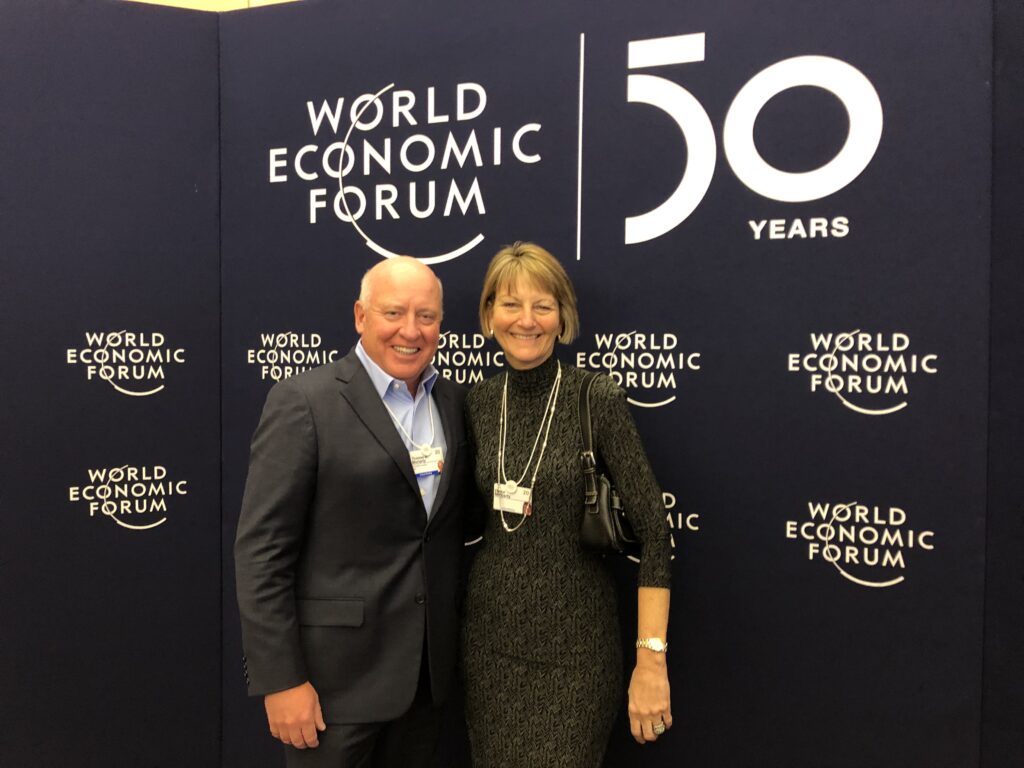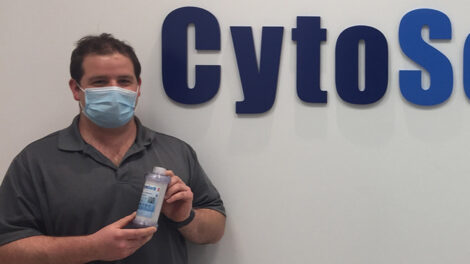‘So much more than a corner drugstore,’ CVS Health continues to shake up health care
By Bryan Hay
With more than 9,900 retail locations nationwide that offer not only health care products but also an array of affordable clinical services, CVS Health continues to expand its reach to improve the health of Americans.
From addressing social injustice and its effect on access to health care to preparing to take on a major role in the distribution of an eventual vaccine for the novel coronavirus, CVS Health continues to leverage its status as the nation’s largest health care company advocate for improved access to affordable health care.
The evolution from corner drugstore to health care company was made clear in 2014, when CVS Health became the first pharmacy chain to stop the sale of tobacco products. It’s now on a mission to create the first tobacco-free generation, and, beyond that, the company is working to address social injustice and its effect on access to health care.
Tom Moriarty ’85, executive vice president, chief policy and external affairs officer, and general counsel at CVS Health, has been on the front lines of the company’s expanding influence and transformation. He took time out of his schedule recently to talk about a range of topics, including how Lafayette College prepared him for his career as the top attorney at CVS Health.
What brought you to CVS Health in 2012?
In 2012, I was president of pharma strategies and general counsel of pharmacy benefit management company Medco Health Solutions. That year, we developed and executed Medco’s strategic merger with Express Scripts, a competitor, completing one of the largest health care transactions to date. After that, I was recruited by CVS Health to join the executive team there.
I benefited a great deal from the government and law program at Lafayette. Led by expert professors, the department’s focused curriculum provided me the opportunity to explore the intersection of law, public policy, and regulation. Insights into those areas proved to be vital tools in successfully navigating the business world.
Was there a reckoning that stopping the sale of tobacco products in 2014 meant CVS Health could do even more to improve people’s health?
We understood that if we were to achieve our goal of becoming a health care company, we needed to address the fundamental inconsistency of selling tobacco products in a health care setting. Despite losing billions of dollars in potential revenue, eliminating tobacco sales played a pivotal role in CVS’s successful transformation.
More importantly, our decision to exit tobacco led to a meaningful decline in smoking. Within 12 months, consumers had purchased 100 million fewer packs of cigarettes in states where CVS Pharmacy had a market presence. Since then, we’ve partnered with leading anti-tobacco and youth organizations with the goal of creating the first tobacco-free generation, including tackling the growing problem of youth vaping.
In addition to creating growth for shareowners, what were some of the other reasons behind CVS Health’s move to expand its health care services beyond pharmacy?
CVS Health is probably best known to consumers by our retail pharmacy locations, but the company is so much more than a corner drugstore. Today CVS Health is a Fortune 5 diversified health services company with over 300,000 colleagues, addressing the health care needs of one in three Americans every year. Our businesses support people every day across millions of health care experiences, choices, and moments to make health care more accessible, affordable, and simply better.

Tom and Diane Moriarty
How did the acquisition of Aetna position CVS Health to respond to the pandemic?
When the coronavirus outbreak hit the United States, we had already undertaken our transformation to a diversified health services company. The COVID-19 pandemic accelerated our ability to harness our diverse capabilities and community touch points in order to meet the needs of the country in accessing health care at a critical time.
We’ve scaled up telemedicine, digital offerings, home delivery, and in-home care in ways that weren’t possible before. We’ve put data analytics to work to most efficiently meet the needs of our patients and customers, assess risk, and allocate resources. We took steps to shore up the pharmaceutical supply chain.
For our Aetna health plan members, we waived copays for telehealth visits and COVID-19 testing, and expanded mental and behavioral health services and resources. And we ramped up outreach to at-risk members who may be delaying critically important care. We have begun working with employers and universities to help them responsibly return to their worksites and campuses with our customizable COVID-19 testing and tracing solution, Return Ready.
Our unmatched community presence across the country has allowed us to lead the way in COVID-19 testing, to help slow the spread of the coronavirus. CVS Health has more than 4,000 drive-thru testing sites at our pharmacy locations, and we’ve worked with our community partners in areas and neighborhoods in greatest need of COVID-19 testing to establish no-cost community testing sites to help people get tested who otherwise might not have access to this essential service. CVS Health has administered more than 6 million COVID-19 tests since March, representing 70 percent of all testing in a retail setting, and we’re ramping up to the capacity to administer approximately 4 million tests per month.
What role will CVS Health play in the eventual distribution of a vaccine against the novel coronavirus?
We think the expertise and infrastructure we have developed to administer flu vaccinations and our demonstrated ability to roll out testing solutions in communities across the country can be applied to the national effort to distribute COVID-19 vaccines when they become available.
Members of our CVS team have been engaged with federal and state officials planning a robust administration strategy, and the Department of Health and Human Services recently announced that CVS Health will be providing COVID-19 vaccinations throughout the country upon availability.
Our front-line clinical staff comprises 28,000 pharmacists, 66,000 trained pharmacy technicians, and 10,000 nurse practitioners, physician assistants, and licensed vocational nurses who will play a leading role in meeting the challenge of vaccinating on a mass scale at the community level. We have made significant investments in the training of our health care workers to handle and administer these vaccines, as well as in our cold chain distribution capabilities and the digital and logistical tools to schedule vaccinations and, importantly, the second booster dose that we expect will be required.
Has CVS Health also ramped up its inventory of flu vaccines?
With COVID-19 sharing many of the same symptoms of the flu, we’ve seen demand for flu shots increase significantly this season. We have already administered more than 9 million flu shots so far this year, and we’re well on our way to up to 20 million by year’s end—more than double the number we administer during a typical season.
What have you done to protect the health of your employees and help them balance work life with their personal schedules?
Our colleagues have been on the front lines of the fight against COVID-19, and their health and safety are our top priority. We took steps early on to help them work safely, like directing personal protective equipment to our providers and retail employees, and installing protective panels at pharmacy and front-store counters.
We provided cash bonuses for front-line and other site-based hourly employees as well as paid time off for part-time employees, and we made dependent care assistance available for families to help them balance the remote learning environment and other disruptions to work and home life brought on by the pandemic. Recognizing the heavy mental and emotional toll of the pandemic, we offer colleagues and their families a suite of benefits and resources to support emotional wellness and build mental health resilience.
What inspired CVS Health’s decision to address racial inequality and the health of Black communities through the commitment of $600 million?
COVID-19 further highlighted the disparate impacts in health care that have existed in this country for generations. At the same time, recent events have brought renewed attention to the ongoing concerns about systemic racism in our society more broadly.
In July, CVS Health announced nearly $600 million over five years to advance initiatives that address inequities faced by Black people and other disenfranchised communities. In addition to several commitments to our own colleagues, we will build on our ongoing work to address social determinants of health—things like housing, education, and employment that affect health and well-being as much as or more than access to care.
We will also expand our Project Health initiative, which provides free health and wellness screenings to at-risk populations, and work with civil rights and social justice organizations to support shared goals.
What led you to Lafayette College as an undergraduate?
Growing up a first-generation American in a family where the importance of a good education was emphasized every day, I was drawn to Lafayette for its well-earned reputation for academic excellence. The size of the school also matched both the educational and student life experience I was looking for. Finding those characteristics in a location like Easton, which is geographically close to the New York area where I grew up, made it the perfect fit.
How did Lafayette prepare you for your career?
I benefited a great deal from the government and law program at Lafayette. Led by expert professors, the department’s focused curriculum provided me the opportunity to explore the intersection of law, public policy, and regulation. Insights into those areas prepared me for law school and have proved to be vital tools in successfully navigating the business world.


